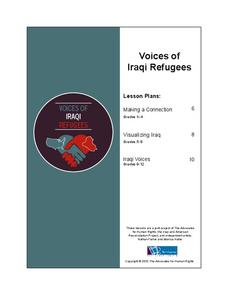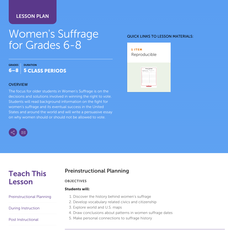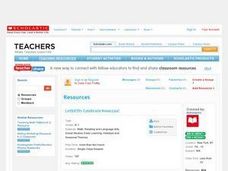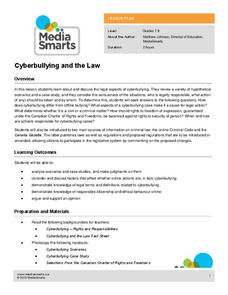Curated OER
The Monroe Doctrine: Whose Doctrine Was It?
Was James Monroe the sole contributor of the Monroe Doctrine? Young scholars study the doctrine and cite evidence to show contributions of John Quincy Adams and Thomas Jefferson in its formulation.
PBS
Breaking the Code: Actions and Songs of Protest
Ezell Blair, Jr., David Richmond, Franklin McCain and Joseph McNeil changed history. Their sit-in at the lunch counter of the Woolworths in Greensboro, North Carolina on February 1, 1960 became a model for the nonviolent protests that...
Scholastic
The First Thanksgiving Feast for Grades 6–8
It's time for the feast! Young historians complete their study of the First Thanksgiving by completing an online activity, watching a slideshow, and examining a First Thanksgiving timeline. After answering text-dependent questions to...
Alabama Department of Archives and History
Women of the Movement: Civil Rights Movement in Alabama
Many know of Rosa Parks involvement in the Civil Rights Movement, but who were other female leaders? The lesson focuses on female Civil Rights leaders and their achievements. Scholars complete research, participate in group discussions,...
NPR
Lesson Plan: Trolls—Just Like You and Me?
Not all trolls hide under bridges; some of them hide behind computer screens! Learners explore the causes and effects of people leaving mean comments online. After learning vocabulary, watching and discussing a video, and responding to...
Media Smarts
Thinking About Television and Movies
As part of their study of the influence of TV and films, class members consider how music, lighting, costumes, camera angles, etc. are used to influence the response of viewers.
Advocates for Human Rights
Voices of Iraqi Refugees
The stated goal of this resource is to provide learners with basic facts about and build empathy for Iraqi refugees. To do so elementary classes develop a plan for how to welcome refugees to their classroom. Middle schoolers read...
Skyscraper Museum
Changes in a City Over Time
Investigate the growth and development of New York City with the final lesson in this four-part series on skyscrapers. Learners first explore the concept of urban growth by looking closely at a series of three paintings made of Wall...
Scholastic
Women's Suffrage for Grades 6–8
Learners study the decisions and solutions involved in winning the right to vote. After reading background information on the fight for women's suffrage, including one woman's story, and its eventual success in the United States and...
Anti-Defamation League
What Is Culture?
Explore the complexity of culture with this rich and comprehensive lesson plan, which will prompt your learners to think critically and respectfully discuss our current definitions of culture, and how those definitions might evolve.
PBS
Evolution of the Presidency: Theodore Roosevelt to Franklin D. Roosevelt
How much power should a president be allowed to exert? Theodore Roosevelt and Franklin D. Roosevelt exercised their power according to their interpretations of the United States Constitution, and these interpretations affected the...
State Bar of Texas
Miranda v. Arizona
You have the right to remain silent—but why? Scholars analyze the nature of what has become known as the Miranda Rights. A short video along with paired group work and discussion opens the issue of the rights of the accused upon arrest....
National Endowment for the Humanities
How to Win a World War
High schoolers are have begun to learn the art of diplomacy with each other, but do they understand how diplomacy works at a global level? The second in a series of four lessons, guides scholars in evaluating primary sources. The why...
State Bar of Texas
Plessy v. Ferguson
Where did separate but equal originate and what does it mean? Scholars investigate the Supreme Court Case Plessy v. Ferguson. Using a short video clip, they analyze the impact the decision of legal segregation had on society in 1896....
State Bar of Texas
Mapp v. Ohio
Do you have a search warrant? Scholars investigate the concept of illegal search and seizure through the eyes of the Supreme Court case Mapp v. Ohio. A short video clip along with paired group work opens discussion on the concept of how...
Stanford University
Battle of the Somme
The Battle of the Somme was a conflict that raged on for months. Academics view a presentation and read text excerpts from newspaper articles to understand the events that turned the battle into a long conflict. The presentation also...
Just Health Action
Equity Impact Review: Green Stormwater Infrastructure in Seattle
Using an Equity Impact Review (EIR) tool, developed by Washington state's King County to "identify, evaluate, and communicate issues of equity when making a decision," class members design a GSI program for two Seattle neighborhoods.
Curated OER
Let's Celebrate Kwanzaa!
Learn more about Kwanzaa with a celebratory lesson. As learners analyze My First Kwanzaa Book by Debbi Chocolate, they compare and contrast the celebration to other holiday traditions they know about. Next, they prepare and play a...
National Endowment for the Humanities
Soviet Espionage in America
The war against Communism and Joseph McCarthy’s place in it are the focus of a series of three lessons examining postwar America from 1945-1950. This first lesson plan asks groups to read an introduction that describes the Verona Project...
Media Smarts
Cyberbullying and the Law
Dealing with the very topical subject of cyberbullying, this lesson plan will surely create some engaged discussion in your classroom. Young learners discuss the laws concerning cyberbullying in Canada, and then respond to a series of...
Newseum
Today's Front Pages
Take a close look at a number of newspapers with collection of lessons and activities. Using a poster (which can be found under the materials tab), learners examine the hard copy of a local newspaper. This leads into an exploration of...
School Improvement in Maryland
Smart Growth
New roads, new businesses, new developments, new mass transit systems. All growth has both positive and negative effects on communities. Government classes investigate the principles of Maryland's 1997 Smart Growth program and the...
Peabody Essex Museum
Chinese New Year Celebrations
Gong He Xin Xi! Happy New Year! Planning a Lunar New Year/Spring Festival Celebration? Check out the activities and resources in a packet that encourages pupils to research the cultural values and traditional practices associated with...
Media Smarts
The Broadcast Project
As part of a unit on media studies, kids are asked to chart their viewing habits, observe the advertising that sponsors their favorite shows, and then to imagine what they would broadcast if given a block of airtime.

























